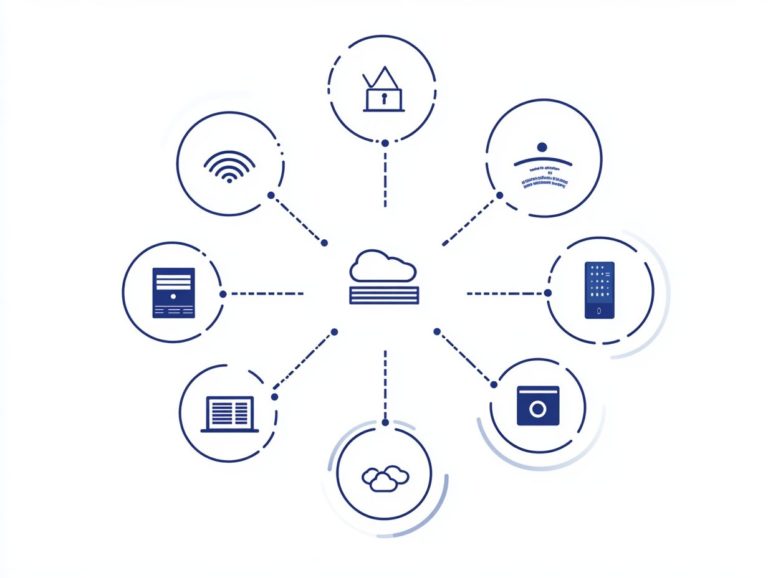5 Factors to Consider When Choosing a Cloud Provider
In today’s digital landscape, selecting the right cloud provider is crucial for businesses aiming to elevate their operations. With a myriad of options at your fingertips, navigating this intricate environment can feel overwhelming.
This article highlights five essential factors to consider:
- Security measures
- Reliability and uptime guarantees
- Scalability and flexibility
- Cost and pricing models
- Customer support
It also offers insights into the fundamentals of cloud computing, the different types available, and how to evaluate your business’s specific needs.
Discover how to make a smart decision that will drive your success in the cloud today!
Contents
- Key Takeaways:
- 1. Security Measures
- 2. Reliability and Uptime Guarantee
- 3. Scalability and Flexibility
- 4. Cost and Pricing Models
- 5. Customer Support and Service Level Agreements
- What Is Cloud Computing and Why Is It Important?
- Frequently Asked Questions
- What are the key factors to consider when choosing a cloud provider?
- How important is security when choosing a cloud provider?
- What does scalability mean in the context of choosing a cloud provider?
- Why is reliability important when choosing a cloud provider?
- How should I factor in cost when choosing a cloud provider?
- What type of support should I expect from a cloud provider?
Key Takeaways:

- Prioritize security measures when choosing a cloud provider to protect sensitive data and prevent cyber attacks.
- Ensure high reliability and uptime guarantees to minimize downtime and maintain business operations.
- Consider scalability and flexibility to easily adjust cloud resources according to business needs and growth.
1. Security Measures
In the realm of cloud computing, security measures are paramount, especially when using platforms like AWS. Protecting sensitive data and ensuring compliance with standards like ISO 27001 and the Cyber Essentials Scheme is essential for reducing risks and enhancing trust among your stakeholders.
To tackle these challenges, cloud providers roll out a variety of robust security measures. Advanced encryption techniques safeguard your data, whether at rest or in transit. Sophisticated firewalls stand guard against unauthorized access.
Identity management systems add another layer of protection. They ensure that only authorized personnel can access critical information. A report from NCC Group reveals that a staggering 93% of organizations faced data breaches due to inadequate security practices.
Case studies show that firms implementing multilayered security strategies not only meet regulatory demands but also cultivate client confidence. This demonstrates how comprehensive protective measures are essential in today s cloud-centric environment.
2. Reliability and Uptime Guarantee
Reliability and uptime guarantees are crucial for businesses leveraging cloud computing solutions, particularly when selecting a provider like AWS. For effective planning, consider the 5 key considerations for cloud migration planning.
AWS ensures minimal downtime and consistent service availability. For many companies, even a fleeting service disruption can lead to substantial financial losses, eroded customer trust, and potential damage to their reputation.
With an impressive uptime guarantee of 99.99%, AWS allows for roughly only 4.4 minutes of downtime per month. This level of reliability often surpasses that of competitors, enabling your organization to operate seamlessly while concentrating on core objectives.
Some AWS services offer extraordinary guarantees, like 99.999999999% for Amazon S3, making AWS the go-to choice for mission-critical applications.
Understanding these reliability metrics empowers your business to make informed decisions, effectively reducing risks associated with potential outages.
3. Scalability and Flexibility
Scalability and flexibility are at the heart of cloud computing. They enable you to adjust resources effortlessly according to your needs. With AWS, you have access to numerous scalability options, including innovative solutions like serverless computing through AWS Lambda. This means you don t have to manage servers manually, saving you time.
As you navigate varying workloads, a nuanced approach to resource allocation becomes essential. For example, a retail company may experience significant spikes in website traffic during the holiday season. In such cases, horizontal scaling adding more instances of virtual machines or containers emerges as a practical solution.
If you re in the financial services sector, vertical scaling might be your preferred strategy. This approach enhances the power of existing servers during peak processing times, ensuring that your resource-heavy applications run smoothly.
Other cloud providers also present similar scalability features, offering you the flexibility to choose the solution that best aligns with your operational dynamics and growth strategies. To make an informed decision, consider what features to look for in a cloud provider.
4. Cost and Pricing Models

Understanding cost and pricing models in cloud computing is essential for you if you re aiming for optimal cost savings. Different cloud providers, like AWS, offer a variety of pricing structures that can have a significant impact on your budget.
Additionally, navigating the AWS Marketplace helps you avoid being stuck with one provider. By diving into these models, you can more accurately assess your needs and make informed decisions.
For instance, you might opt for a pay-as-you-go approach, which offers flexibility to scale resources based on fluctuating demand. Choosing reserved instances allows you to secure substantial discounts in exchange for long-term commitments.
Another pathway is spot pricing, which can lead to significant savings, though it comes with the risk of potential interruptions during peak demand. By comparing costs across leading providers like AWS, Microsoft Azure, and Google Cloud, you can effectively manage your cloud expenditures and maximize your return on investment.
5. Customer Support and Service Level Agreements
Customer support and service level agreements (SLAs) are vital elements to consider when selecting a cloud provider because they define the level of assistance and accountability you can expect. Additionally, you should be aware of the 5 things to know before choosing IaaS. AWS stands out with its comprehensive support options tailored to meet a wide range of customer needs across various industries.
Responsive customer support is crucial, especially when your business heavily relies on cloud infrastructures for daily operations. Different tiers of service come with varying response times and dedicated resources, significantly impacting how quickly your issues are resolved.
SLAs are crucial, clearly outlining your expectations for support availability and performance metrics. AWS provides a robust support framework, complete with extensive documentation and fast response times. In contrast, other providers may not offer the same level of reliability, potentially leading to frustrating experiences.
As you evaluate cloud options, it’s essential to compare support models carefully to ensure you select a provider that aligns seamlessly with your operational needs. Understanding the features that differentiate cloud providers can help in making a more informed choice.
What Is Cloud Computing and Why Is It Important?
Cloud computing is a game-changer that enables you to harness shared computing resources via the internet. It caters to various customer needs, such as efficient infrastructure management and fueling advanced technologies like generative AI and machine learning. This ultimately gives you an edge in innovation and competitive advantage.
At its essence, cloud computing includes a suite of services think storage, processing power, and application hosting available in different models like public, private, and hybrid clouds. This flexibility allows you to scale resources up or down as required, ensuring you remain cost-effective while adeptly responding to dynamic business demands.
By embracing cloud solutions, you enhance collaboration and streamline operations, making it easier to adopt technologies like AI and machine learning. Its importance is magnified as it facilitates the seamless functioning of these technologies, leading to smarter decision-making processes and more personalized experiences for your customers.
What Are the Different Types of Cloud Computing?
Cloud computing presents a range of deployment models, including public, private, and hybrid clouds. Industry leaders like AWS, Microsoft, and Google deliver unique features and capabilities designed to meet your specific organizational needs.
These models are tailored to address particular requirements, enabling you to select the most appropriate option for your workloads and compliance mandates.
- Public clouds, like AWS and Google Cloud, are excellent for startups due to their scalability and accessibility via the internet, making them perfect for dynamic applications that require agility.
- Conversely, private clouds, often deployed through Microsoft Azure, provide enhanced security and control, making them highly appealing to enterprises with stringent regulatory demands.
- Hybrid clouds skillfully integrate both models, enabling your organization to leverage the strengths of each while ensuring flexibility and efficiency for diverse use cases, including big data processing and application development.
Evaluate your cloud options carefully to discover which model best suits your organization s needs!
What Are the Key Considerations When Choosing a Cloud Provider?

Choosing a cloud provider involves key factors like reliability, scalability, and avoiding vendor lock-in. To make an informed decision, consider these 5 tips for evaluating cloud service providers, which ensures a balanced and strategic choice.
Compliance standards are critical, especially if you handle sensitive data or operate in regulated industries. Evaluate how well the provider adheres to regulations like GDPR or HIPAA to maintain data security.
Pricing models are also essential; scrutinizing them helps you avoid unexpected costs. Determine whether a pay-as-you-go or flat-rate model better suits your operational needs.
Robust customer support can be a game changer. Assess response times and availability of support channels, such as live chat or dedicated account managers, to ensure you get the help you need.
By thoroughly researching the features of top cloud storage providers, you can make informed decisions that significantly enhance your cloud experience.
How Can a Business Determine Their Cloud Computing Needs?
To assess your cloud needs, analyze your current infrastructure and performance metrics. Tailor solutions to fit your operational requirements.
Begin with a review of your technology landscape, including hardware, software, and network capabilities, to identify areas for enhancement.
Analyze performance metrics to gain insights into system responsiveness, uptime, and workload distribution. Tools like the AWS Well-Architected Tool can help establish benchmarks for your decisions.
Strategic forecasting is vital; it allows you to anticipate growth and plan effectively for cloud expenditures and resource allocation.
What Are the Common Challenges of Migrating to the Cloud?
Migrating to the cloud poses challenges like vendor lock-in and data security concerns. Evaluating cloud providers’ performance through careful planning is crucial to minimize risks.
If not navigated properly, these challenges could lead to delays and unexpected costs. For example, shifting an entire database without adequate preparation may result in prolonged downtime or data loss due to inadequate backups.
To avoid pitfalls, conduct thorough assessments of your existing infrastructure before migration. Tools like AWS Migration Hub can simplify the process by providing a clear overview of your strategy and tracking progress.
Training employees on cloud technologies will smooth the transition and enhance productivity.
What Are the Benefits of Choosing the Right Cloud Provider?
The right cloud provider offers numerous benefits, including cost savings and improved efficiency. Before making a decision, consider the 5 things to consider before choosing PaaS to find a partner that aligns with your goals for transformative results.
For instance, a leading retail chain reported a 30% reduction in operational costs after migrating to a cloud platform that tailored solutions for its inventory management.
A financial services firm experienced faster transactions and enhanced security, leading to increased customer satisfaction. These examples show how the right partnerships optimize technological investments and build resilience.
Frequently Asked Questions

What are the key factors to consider when choosing a cloud provider?
When choosing a cloud provider, consider five key indicators: security, scalability, reliability, cost, and support.
How important is security when choosing a cloud provider?
Security is crucial. You need to ensure your data is protected from cyber threats and potential breaches.
What does scalability mean in the context of choosing a cloud provider?
Scalability means the provider can meet your business’s changing needs. They should handle sudden spikes and gradual increases in workload.
Why is reliability important when choosing a cloud provider?
Reliability matters because your data and applications must be accessible at all times. Downtime can lead to lost productivity and revenue.
How should I factor in cost when choosing a cloud provider?
Cost is a key consideration. Compare pricing structures to find the best value for your business needs.
What type of support should I expect from a cloud provider?
A good provider offers 24/7 technical support, regular updates, and a reliable customer service team to assist with any issues.




